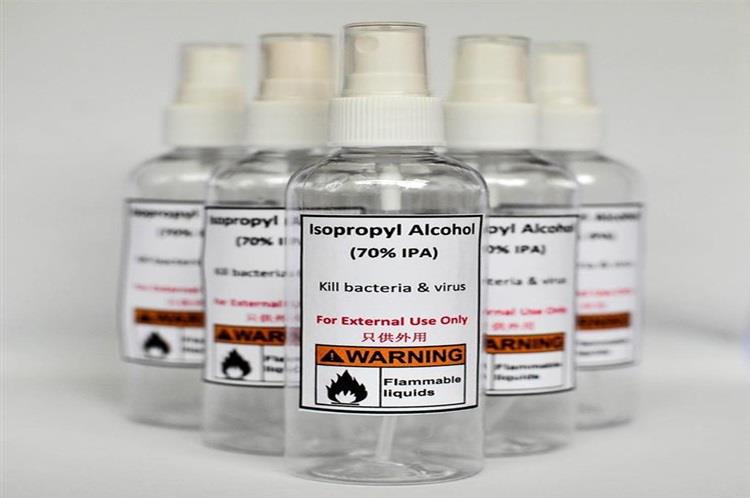
- 09 April 2024
- 1519 Views
Introduction
Isopropyl Alcohol (IPA), also known as rubbing alcohol, is a compound that has garnered extensive recognition and usage across various industries due to its exceptional properties and effectiveness. This article aims to shed light on what Isopropyl Alcohol is, delve into its chemical makeup, explore its myriad uses, and offer insight into its safety protocols. Whether you're a professional in the medical field, involved in industrial manufacturing, or simply curious about the applications of IPA in daily life, this comprehensive guide provides all the necessary information, making it your go-to resource on the subject.
What is Isopropyl Alcohol?
Isopropyl Alcohol (C3H8O) is a colorless, flammable chemical compound with a strong odor. It is synthesized through the hydration of propene, a process that yields this versatile solvent. IPA's structural formula, where a hydroxyl group is bound to a carbon atom, makes it miscible with water, alcohol, ether, and chloroform, showcasing its compatibility with various substances.
The Technical Aspects and Applications of Isopropyl Alcohol (IPA)
Isopropyl Alcohol (IPA), a versatile solvent, is integral in various sectors due to its unique chemical properties and wide range of applications. This section delves into the technical information, practical applications, benefits, risks, and provides a concise table summarizing its key attributes.
Technical Information:
| Attribute | Details |
|---|---|
| Chemical Formula | C3H8O |
| Boiling Point | 82.6°C |
| Melting Point | -89°C |
| Density | 0.786 g/cm³ |
| Solubility | Miscible with water and other solvents |
| Vapor Pressure | 33 mmHg |
| Applications | Medical, Industrial, Household Cleaning, Cosmetic |
| Benefits | Antibacterial, Quick Drying, Versatile, Cost-Effective |
| Risks | Flammable, Health Hazards, Environmental Impact |
The Chemical Properties of IPA
Understanding the chemical properties of Isopropyl Alcohol is crucial for its effective and safe application. It has a boiling point of 82.6 degrees Celsius and a melting point of -89 degrees Celsius, indicating its volatility and the need for careful handling at different temperatures. Moreover, its solubility with water and other organic compounds makes it an excellent solvent for countless applications.
Key Uses of Isopropyl Alcohol
1. Medical and Sanitary Applications
IPA is widely used in the medical field for sanitizing surfaces, sterilizing instruments, and as an antiseptic for treating minor wounds. Its effectiveness in killing bacteria, viruses, and fungi makes it a staple in hospitals, clinics, and homes for maintaining hygiene.
2. Cleaning and Household Uses
Thanks to its evaporation rate, Isopropyl Alcohol is a preferred cleaning agent for electronic devices, glass, and metal surfaces. It dissolves a wide range of non-polar compounds, making it ideal for removing grease, ink stains, and residues without leaving moisture behind.
3. Industrial and Manufacturing Uses
In industries, IPA is utilized as a solvent in the production of various products, including cosmetics, pharmaceuticals, and foods. It also plays a crucial role in the manufacturing of electronics, particularly in the cleaning of circuit boards to prevent short circuits.
4. Personal Care and Cosmetic Products
Isopropyl Alcohol finds its way into many personal care products such as hand sanitizers, aftershaves, and lotions due to its antiseptic properties. However, its concentration is carefully managed to ensure safety and effectiveness.
Benefits of Isopropyl Alcohol:
- Antibacterial Properties: Effectively kills bacteria, viruses, and fungi, making it a powerful disinfectant.
- Evaporation Rate: Dries quickly, leaving no moisture behind, which is ideal for cleaning electronics and other sensitive items.
- Versatility: Can be used in a myriad of applications, from medical disinfection to industrial manufacturing processes.
- Cost-Effective: IPA is relatively inexpensive to produce and purchase, making it an accessible solvent for various needs.
Risks of Isopropyl Alcohol:
- Flammability: Highly flammable, posing a risk of fire if not handled properly.
- Health Hazards: Prolonged exposure can irritate the eyes, skin, and respiratory system. Inhalation of high concentrations can be toxic.
- Environmental Impact: While not considered a major environmental hazard, improper disposal can lead to pollution and affect aquatic life.
Safety Measures and Precautions
While Isopropyl Alcohol is invaluable for its versatility, it's important to handle it with care. Its flammability requires it to be stored away from open flames and high temperatures. In terms of health, prolonged exposure can lead to irritation of the eyes, skin, and respiratory system, emphasizing the need for proper ventilation, protective clothing, and adherence to recommended usage concentrations.
Conclusion
Isopropyl Alcohol's significance cannot be overstated, with its applications spanning from healthcare to electronics and beyond. Its chemical properties, coupled with its effectiveness as a solvent and disinfectant, make it a vital substance in both professional and personal settings. By understanding its uses and exercising the necessary safety precautions, one can harness the benefits of IPA across various domains, ensuring cleanliness, efficiency, and well-being.
